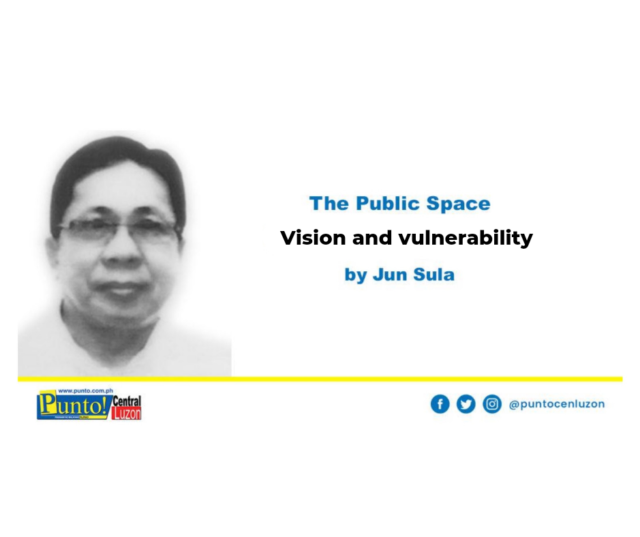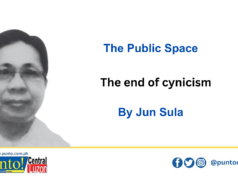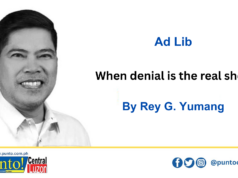TWO PRESIDENTIAL interviews after, the Filipino people, voters and no—publics, and there are many types according to a political professor of note—have a better knowledge and insight of six minus one presidential aspirants. Surprise: this political science expert says no candidate is responsible to be in those interviews.
Forget the volatile-free , friendly, if romanticized one-on-one , back-and-forth where market-tested motherhoods and banana-peel words, with apology to Joe Klein of Political Lost, flourish a la carte. There may be some admissions, not candor, but titillating promises that conjure up mythical golden age, or nostalgic fiction , or something to that effect. Focus on the narrator, not the narrative, please.
Seriously , vision is important, ideal. According to the dictionary, vision is the ability to think about or plan for the future with imagination and wisdom – with emphasis on wisdom. Everybody can imagine, not everybody is wise. Is Senator Manny Pacquiao’s 22-point agenda superior to Mayor Isko Moreno’s 10-point agenda? Is Senator Ping Lacson’s pledge of leading by example better than Vice President Leni Robredo’s living it?
A vision is the difference between the “hitting the ground running” of former President Fidel V. Ramos and the “ on autopilot mode” ascribed to the Duterte administration, not necessarily by the pinklawan but by the cognoscenti. It connotes a pilot landing safely his plane on the ground and another flying blind overshooting the runway, or worse, crashing it somewhere. It’s the difference between success and failure.
“Without vision, a nation will perish,” Solomon said, the wisest, richest of all but flunked the character test, especially with his many wives. The rest was history for Israel. Where are we in history? At last count, the Philippines was 113th in the global corruption index,out of about 170 or so countries. Long way to go for the man who vowed to eradicate it since 2016 but has only about three or four months to go to see his pledge largely unfulfilled. Ditto the jet ski bravado.
The 18th century British philosopher John Mills warned against the unintended consequence of a representative government. Low intellect leaders are part of the deal. They may be public officials, not necessarily leaders and vice versa. Reviewing Philippine history, one wonders if lawyers have been a boon or a bane to the country’s leadership and politics. Ramos wasn’t, but he may be the exception that proves the rule.
Leadership is also a position of vulnerability. Wikipedia refers to it as the inability to withstand a hostile environment( biased, tough and credible journalists?) “ A window of vulnerability is a time frame within which defensive measures are diminished , compromised or lacking( public interviews?)”. In other word, weakness. Is that why the son of a former dictator-president, no doubt a leader, has shied away from televised interviews beamed nationwide , not once but twice?
“What happens when people open their hearts?, asked Haruki Murakami. His answer: they get better. “Owning your story can be hard,” wrote Brene Brown, “ but not nearly difficult as spending your life running away from it”. Apparently, someone feels no need to get better or prefers to run away from his family’s story.
Difficult,indeed, it would be to own on public television stories of stolen wealth, plunder, murder, tax evasion, lying about a degree from an elite university from a far land. Even just being asked about them can be traumatic. It is must easier to mouth a general theology: corruption is a human condition, not a political one. Vulnerability is risk. Risk means cost. Cost may be potentially losing the election in the ballot boxes, or much earlier, in the court. Theology may be the easy way out of the real narrative. Also cheaper, given what’s at stake.
“Integrity stores up principal for the future generation,” wrote Marvin Olasky in his book on leadership,” but the lack of it always leaves a bill, although one that might not be presented for many years.” A reversed pay– it forward at the expense of the citizenry. Huge debt is one big problem the next president will have on his/her plate. Guess who’s to blame?
At least two presidential aspirants espouse leadership by example: Moreno and Sen. Ping Lacson. It’s good, refreshing and reassuring on public television. But wait, a cautionary tale.
Moreno has fessed up to keeping excess contribution to his campaign in the mayoralty race three years ago to the tune of P50 million. “Do you think that was the right thing to do” asked a media panelist pointblank. Moreno didn’t miss a beat. “ I didn’t break a law,” he said, missing the whole point completely. Next time, if there are new laws or regulations about excess donations, he will toe the line. In the meantime, he will continue paying the corresponding taxes. Flashing his telegenic grin all the way to the bank, thank you.
Lacson, on the other hand, was hard pressed in giving convincing answers to two questions 1) Why did he hide when a warrant arrest was issued against him for an alleged crime ?2) Why didn’t he arrest the person who sent bribe money to his office? The mystery remains, notwithstanding his explanation. By now, he should realize that closure, like healing, is a matter of time as well as opportunity. The latter isn’t promising, given the last survey ratings which placed him at the bottom of the race. History may do him justice in time.
For Robredo as well as for the obscure Leony de Guzman, it’s been clear as day that there have been no innuendos or insinuations of flawed moral character. Never mind the labor leader; he’s probably not in it to win it, or is a long, long shot.
More public interviews of the presidential aspirants are in the offing. For strategic reason, five of them find the on-the-spot, in-your-face questions, tough and honest as they come ,the prize to pay for aiming to be the highest official of the land. For the same reason, the other one refuses to join them in telling the Filipino people they are worthy of the public trust they seek .
More than the others, BBM owes the nation a real sense of accountability, past, present and future. Like the others, he should be more than promising. As an American senator urged his father before the EDSA People Power Revolution in 1986, cut and cut cleanly.





